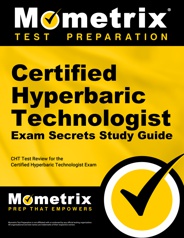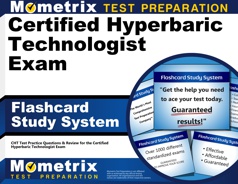The National Board of Diving and Hyperbaric Medical Technology’s (NBDHMT) Certified Hyperbaric Technologist (CHT) exam is used to test your skillset as it pertains to providing hyperbaric therapy.
Click “Start Test” above to take a free Hyperbaric Technologist practice test, and check out our premium-quality Hyperbaric Technologist test prep resources by clicking the links below!
Exam Eligibility
Because the CHT is not an entry-level certification, you must hold a current and valid medical license in one of the pathways:
- Respiratory Therapist
- Physician’s Assistant
- Active Duty Military Corpsman
- EMT/Paramedic
- Registered Nurse (RN) or License Practical Nurse (LPN)
- Nurse Practitioner
- Physician
You must also meet these additional requirements:
- Complete an NBDHMT-approved hyperbaric medicine introductory training course within three years of sitting for the CHT exam
- Complete the Transcutaneous Oxygen Monitoring (TCOM) module as a part of a clinical internship
- Obtain 480 hours of clinical work experience in undersea hyperbaric medicine or aviation medical technology, with 40 hours in a supervised clinical internship approved by NBDHMT and with a preceptor that has a minimum of two years of experience as a CHT or Certified Hyperbaric Registered Nurse (CHRN)
- Military personnel must complete 1,000 hours in addition to military occupational training unless the service member can complete a clinical internship at an NBDHMT-approved facility
- Maintain the continuing education and recertification requirements indicated by NBDHMT
About the Certified Hyperbaric Technologist Exam
The Certified Hyperbaric Technologist exam contains 120 questions, which will be a mix of multiple-choice and true-or-false. During the 2-hour exam, you can flag questions for review and change your answers until you run out of time or submit your exam for evaluation.
The material used for question development comes from four primary sources:
- National Fire Protection Association 99, Chapter 14, 2018
- Hyperbaric Facility Safety: A Practical Guide, 1999
- Hyperbaric Oxygen Therapy Indications, 2019
- Hyperbaric Medicine Practice, 2017
Competency Standards
The CHT exam evaluates your knowledge and understanding to ensure you have the applicable knowledge to meet the clinical, technical, and safety needs of undersea and hyperbaric medicine.
As such, there are a handful of established competency standards that you should have a strong knowledge of.
1. General Information
- Physical aspects of pressurized exposure
- Converting common pressure units used in diving and hyperbaric practice
- Laws pertaining to hyperbaric practice (Boyle’s Law, Dalton’s Law, Gay Lussac’s Law, Henry’s Law)
- The principles of heat transfer by conduction, convection, and radiation
- The effects of pressure change and potential barotrauma on the ears, sinuses, teeth, lungs, and GI tract
- Signs and symptoms of decompression illness
- The aspects of diving and hyperbaric medicine on anatomy and physiology, specific to the musculoskeletal, neurological, integumentary, cardiovascular, and respiratory systems
- Providing clinical support to prevent or manage pressure-related problems alongside a medical care team
2. Gas Systems
- Purity and oxygen content of gases
- Mathematical calculations to indicate gas usage
- Gas analyzers
- Oxygen cleanliness in a hyperbaric delivery system
- Gas line filtration
- Calibration of gas analyzers, including delivery of multiple gases and monitoring the chamber depth, temperature, and humidity
- Gas stratification and prevention
- Recording maintenance of all aspects of the hyperbaric delivery system, including gas reserves and mixtures
3. Chamber Operations and Environment
- Routine maintenance and repair of chambers, equipment, acrylic viewports, gas supplies, multiplace chamber patient breathing systems, and air and medical gas and fluid systems
- Thread forms, their differences, and their uses
- Identification, handling, and storage of high-pressure gas cylinders
- Emergency preparedness for fire, oxygen loss, communication loss, and medical complications
- Fire suppression systems
- Regulatory agency and related organization familiarity
4. Clinical Skills
- Patient assessment and documentation of the findings, including pain and vital signs
- Patient observation for changes in neurological status
- Clean and sterile techniques and their indications for use
- Patient care procedures, including collecting and removing waste, dressing changes, assistive devices, preparation for treatment, and EKG recognition
5. Generalized Clinical Knowledge
- CPR/the ability to establish an airway
- Signs, symptoms, and immediate management of hyperthermia and hypothermia
- The effect of gases on the body, the effect of pressure on the body, and the principles of decompression and therapeutic procedures
- Basic medical terminology, patient privacy and HIPAA, and medical record-keeping
- Transcutaneous oximetry (TCOM) testing
- Using restraints, ensuring circulation is maintained
- Maintaining communications with the entire care team and protecting one’s self and colleagues from injury
6. Infection Control Measures
- Universal precautions
- Approved disinfectants for the chamber and equipment
- Recognizing the risks associated with off-gassing
- Consistent hand washing
- Consistent use of personal protective equipment
Check Out Mometrix's Certified Hyperbaric Technologist Study Guide
Get practice questions, video tutorials, and detailed study lessons
Get Your Study Guide
Exam Registration
If you meet the requirements for the CHT exam, complete the registration form found on the NDBHMT website. Your application needs to include the following:
- A Certificate of Completion for an NBDHMT-approved Introductory Hyperbaric Medicine Training Course
- A copy of your vocational license or certificate
- Proof of completion of three preceptored TCOM studies
- Written notification of the 40 hours Supervised Clinical Internship
- A letter of recommendation from your immediate supervisor verifying 480 clinical internship hours
- Background verification fee of $25
- Examination fee of $175
Once you have gathered the required information and completed the Examination registration form, mail it, along with your payment, to NBDHMT. The background and examination fees are payable by check, money order, Visa, or MasterCard. You will need to mail your application at least 30 days before your desired examination date.
Once the board receives your application, they will confirm your selected testing date and time. Once your appointment is confirmed, your registration and payment are processed.
NBDHMT will send your receipt of payment and confirmation of your testing date, location, and time 21 days before your scheduled date. If NBDHMT cannot confirm your requested testing date or location, they will contact you to make alternate arrangements.
Test Day
On the day of your exam, you should arrive at least 15 minutes before your start time. Coming early allows you to complete the test day activities, including presenting your ID for verification, storing your gear, and receiving directions for your exam from test center personnel.
The testing center provides a set of US Navy Air Decompression Tables and scratch paper. Bring a writing utensil and a simple, non-memory storing calculator.
How the Exam is Scored
Each correct answer is worth one point, and your points are combined to come up with your total exam score. You must answer 84 questions correctly to meet the passing score of 70% and receive certification. If you score 90% or greater, you are graded “With Distinction.” The “With Distinction” designation is only available on your first attempt. If you take the exam a second time and score 90%, you will not receive the designation.
Call NBDHMT at least 24 hours after exam completion to receive your score.
Retaking the Exam
If you receive a failing score (less than 70%), you must wait three months before applying to retake the exam. The fee for each retake is $150.
You can retake the exam a total of two times. If you are unsuccessful on the third attempt, you must retake an NBDHMT-approved Hyperbaric Medicine training course and repeat the internship and preceptorship.
Check Out Mometrix's Certified Hyperbaric Technologist Flashcards
Get complex subjects broken down into easily understandable concepts
Get Your Flashcards
How to Study for the CHT Exam
How to Study Effectively
Your success on CHT test day depends not only on how many hours you put into preparing but also on whether you prepared the right way. It’s good to check along the way to see whether your studying is paying off. One of the most effective ways to do this is by taking CHT practice tests to evaluate your progress. Practice tests are useful because they show exactly where you need to improve. Every time you take a free CHT exam practice test, pay special attention to these three groups of questions:
- The questions you got wrong
- The ones you had to guess on, even if you guessed right
- The ones you found difficult or slow to work through
This will show you exactly what your weak areas are and where you need to devote more study time. Ask yourself why each of these questions gave you trouble. Was it because you didn’t understand the material? Was it because you didn’t remember the vocabulary? Do you need more repetitions on this type of question to build speed and confidence? Dig into those questions and figure out how you can strengthen your weak areas as you go back to review the material.
Answer Explanations
Additionally, many Certified Hyperbaric Technologist practice tests have a section explaining the answer choices. It can be tempting to read the explanation and think that you now have a good understanding of the concept. However, an explanation likely only covers part of the question’s broader context. Even if the explanation makes sense, go back and investigate every concept related to the question until you’re positive you have a thorough understanding.
Comprehend Each Topic
As you go along, keep in mind that the Certified Hyperbaric Technologist practice test is just that: practice. Memorizing these questions and answers will not be very helpful on the actual test because it is unlikely to have any of the same exact questions. If you only know the right answers to the sample questions, you won’t be prepared for the real thing. Study the concepts until you understand them fully, and then you’ll be able to answer any question that shows up on the test.
Strategy for Certified Hyperbaric Technologist Practice
When you’re ready to start taking practice tests, follow this strategy:
- Remove Limitations. Take the first test with no time constraints and with your notes and Certified Hyperbaric Technologist study guide handy. Take your time and focus on applying the strategies you’ve learned.
- Time Yourself. Take the second practice test “open book” as well, but set a timer and practice pacing yourself to finish in time.
- Simulate Test Day. Take any other practice tests as if it were test day. Set a timer and put away your study materials. Sit at a table or desk in a quiet room, imagine yourself at the testing center, and answer questions as quickly and accurately as possible.
- Keep Practicing. Keep taking practice tests on a regular basis until you run out of practice tests or it’s time for the actual test. Your mind will be ready for the schedule and stress of test day, and you’ll be able to focus on recalling the material you’ve learned.
FAQs
Q
How many questions are on the Certified Hyperbaric Technologist exam?
A
There are 120 questions on the exam. Each question will be either multiple-choice or true-or-false.
Q
How long is the Certified Hyperbaric Technologist exam?
A
The time limit for this exam is 2 hours.
Q
What is a passing score for the Certified Hyperbaric Technologist exam?
A
To pass this exam, you will need a score of at least 70%, which means you must answer at least 84 questions correctly.
Mometrix Test Preparation is not affiliated with or endorsed by any official testing organization. All organizational and test names are trademarks of their respective owners.
